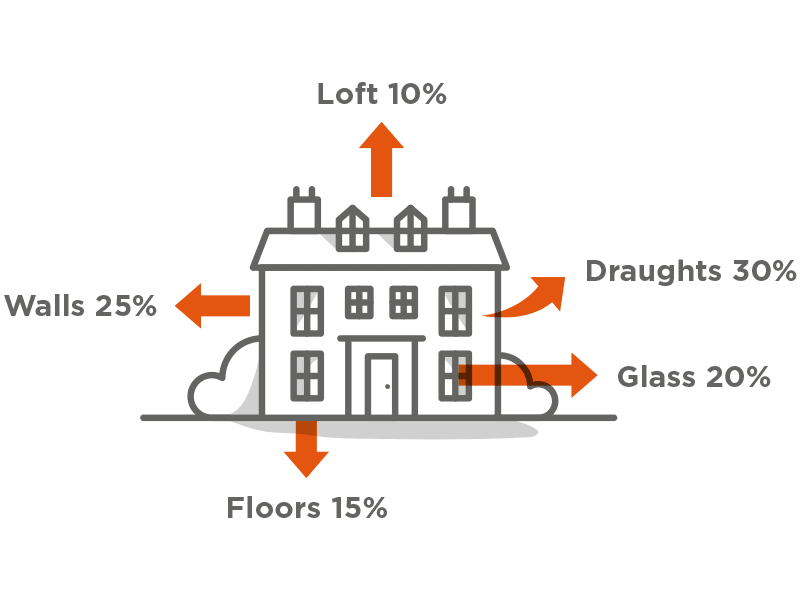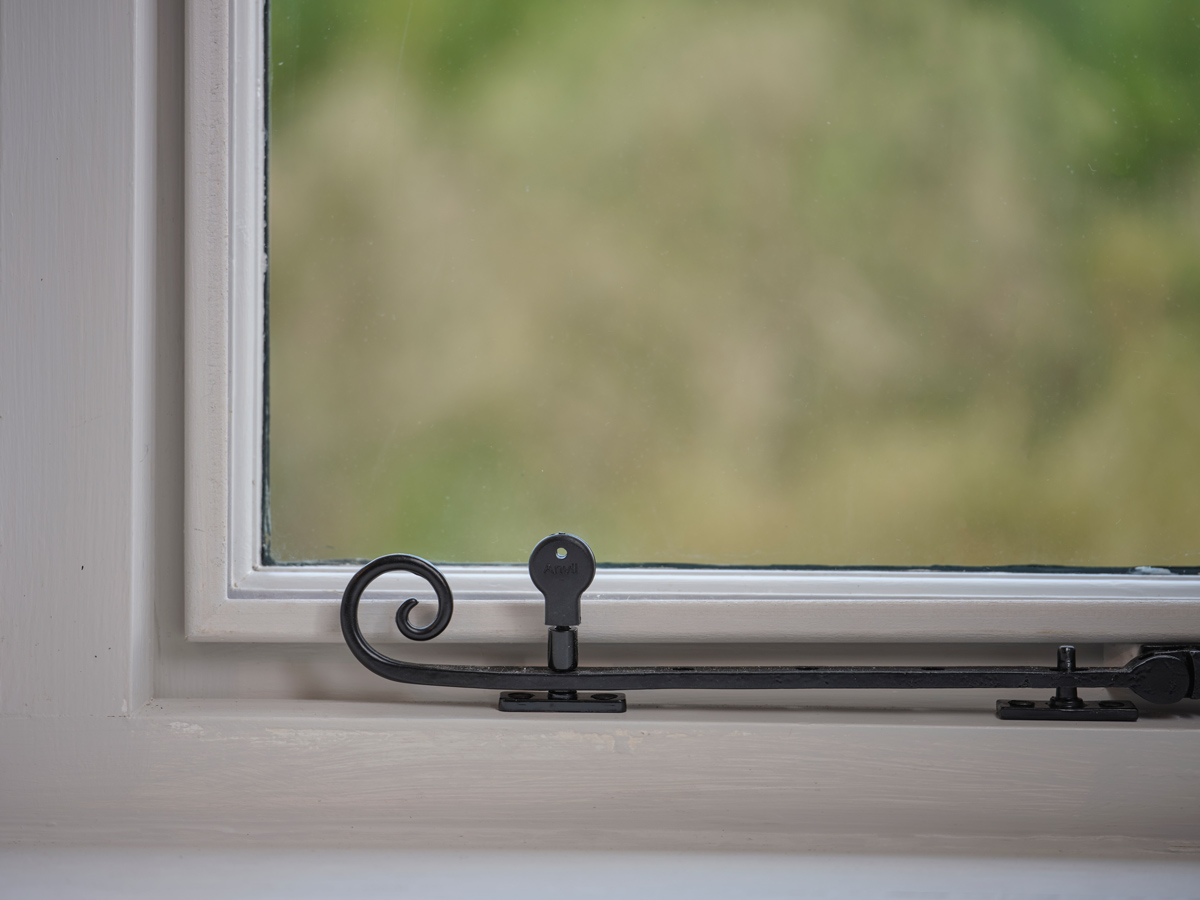Your home loses heat in five main areas …

The loss of so much heat will make your home chilly in winter, forcing you to turn up your thermostat, and leading to higher energy bills. The easiest way to combat heat loss, particularly in a period property, is to install insulation.
The low-hanging fruits are loft insulation, advanced secondary glazing and draught proofing, which together can reduce heat loss by 40% in a detached property and 50% in a mid-terrace property. Just imagine the difference that would make to the cost of heating your period property in winter.
Our innovative insulation solutions are well suited to preserving Dorset’s celebrated architecture, fine examples of which can be found in areas such as Bournemouth, Poole, Weymouth, Dorchester and Wimborne plus other areas in this magnificent county.
We can install these three solutions in your Dorset home between 1-3 weeks depending on the size of your property, and you can use your home as usual during the installation.

Our team of craftsmen and women are friendly, professional and efficient, and we focus on working cleanly so you experience minimal disruption and mess. And, of course, they clean up thoroughly during and at the end of the job so everything is exactly as it was before they arrived.
What’s the payback period?
To cover the cost of your investment, most people will see additional savings in approximately 5-10 years, which is equivalent to gaining over 10% interest on your investment.

Further insulation
After secondary glazing, loft insulation and draught proofing, the most effective solutions are wall and floor insulation. They are a little more involved and expensive so are best considered after the first three measures. However, as fuel bills continue to rise they become more and more cost effective every year – and it’s particularly nice to be warm underfoot in winter!
What are the benefits of full home insulation?
Energy efficiency: Proper insulation helps in maintaining a consistent temperature inside your home, reducing the need for heating in winter and cooling in summer. This leads to lower energy bills as you use less energy to maintain a comfortable temperature.
Reduced carbon emissions: By using less energy to heat or cool your home, you contribute to lowering carbon emissions associated with energy production. This helps in combating climate change and reducing your carbon footprint.
Improved comfort: Insulation helps to keep your home warmer in winter and cooler in summer, creating a more comfortable living environment for you and your family. It also helps to reduce draughts, making your home feel cosier.
Noise reduction: Insulation can act as a sound barrier, reducing the transmission of noise from outside, such as traffic or neighbors. This can lead to a quieter and more peaceful living environment.
Prevention of condensation: Adequate insulation can help prevent condensation buildup inside your home, which can lead to dampness and mold. This improves indoor air quality and protects your home from potential damage caused by dampness.
Increased property value: A well-insulated home is more attractive to potential buyers as it offers lower energy bills, improved comfort, and reduced maintenance costs. This can potentially increase the resale value of your property.
Your home insulation questions answered
Common types include fibreglass, cellulose, spray foam, rigid foam boards, and reflective insulation. However, at Mitchell & Dickinson, we prefer to use environmentally friendly sheep’s wool insulation for under floors, ceilings and lofts. This natural material has many beneficial properties including a 60-year life compared to 15 years for glass wool, and an increase in insulation properties in damp conditions. It’s treated with natural borax to prevent damage from pests, not irritating to skin or respiratory systems, supports British sheep farmers – improving economic resilience – and uses little energy in manufacture.
Common signs include fluctuating indoor temperatures, high energy bills, draughts, and uneven heating or cooling. Mitchell & Dickinson can carry out a full property survey to establish where your home is losing heat and could benefit from insulation.
Insulation helps regulate indoor temperature, reduces energy consumption, lowers utility bills, enhances comfort, and contributes to soundproofing and pest control.
Savings vary depending on factors like climate, existing insulation, and energy usage, but it can range from 10% to 50%.
Some insulation types can be DIY, but others may require professional installation for safety and effectiveness. If you choose to insulate your home with Mitchell & Dickinson we’ll take care of everything for you – from establishing what insulation solutions you need, installing the insulation and advising you on further things you can do to reduce heat loss from your home.
Insulation lifespan varies but can last anywhere from 20 to 100 years depending on the material and conditions. Mitchell & Dickinson’s sheep’s wool insulation typically lasts for around 60 years.
Health concerns may include skin irritation or respiratory issues during installation. Safety concerns include fire hazards for certain insulation types. However, Mitchell & Dickinson’s Thermafleece insulation is treated with natural borax to prevent damage from pests and is not irritating to skin or respiratory systems.
Proper insulation should be balanced with ventilation to prevent indoor air quality issues and moisture buildup. When we do your property survey, we will make sure that any insulation measures we suggest are balanced with proper ventilation.
Yes, eco-friendly options include recycled materials like denim or cellulose, as well as natural materials like our Thermafleece sheep’s wool insulation. When you choose Mitchell & Dickinson insulation you can rest assured that you are opting for an environmentally friendly option.
Well-insulated homes are often more attractive to buyers due to lower energy costs and increased comfort, potentially increasing resale value.
Regular inspections for damage or deterioration, especially in areas prone to moisture, can help maintain insulation effectiveness.







